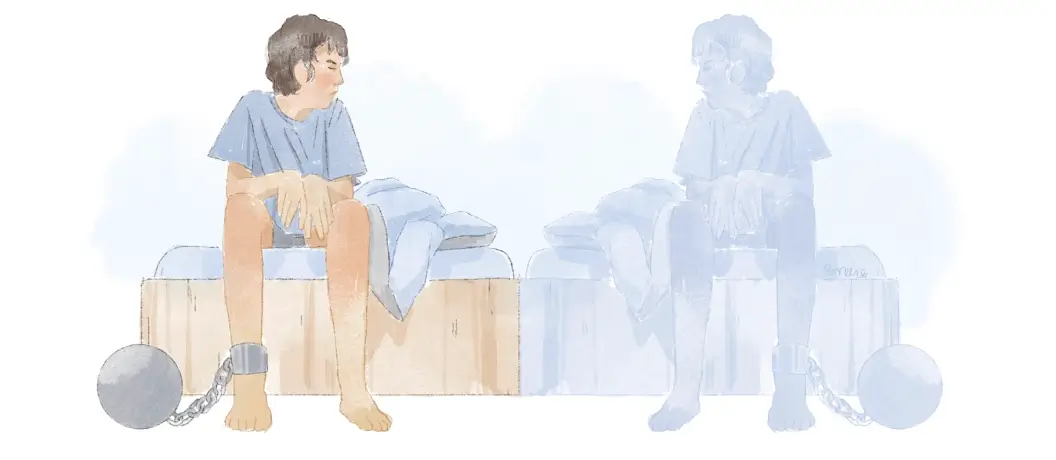Guilt. That burning feeling in your stomach that reminds you you did something wrong. Feeling guilty is a human thing, helping us learn from our mistakes. But sometimes, guilt is here to stay for a while, like that nagging background noise in every interaction.
Ever catch yourself apologizing for things you didn’t even do, like accidentally bumping into someone on the street and saying, “I’m so sorry!”? Or maybe you replay past chats in your head, worried you might have upset someone with a harmless joke. Even in minor situations, that constant guilt might be a sign of something bigger — a guilt complex.
It can make you feel like you constantly have to walk on eggshells: saying “no” to a friend for going out makes you a bad person, or taking some time for yourself means you’re neglecting your family. This constant burden chips away at your confidence and makes relationships quite challenging.
This article explores why people feel guilty for no reason, what might cause a guilt complex, and how guilt affects people.
Why do I feel guilty?
Guilt complexes can stem from various sources. Here’s a breakdown of some common triggers, along with examples and tips on how to deal with guilt:
Feeling anxious
Social interaction can be stressful sometimes, especially if you are worried about what to say or if people will like you. This can make you feel guilty that you’re not as fun or interesting as you want.
For example, maybe you’re having a few friends over. You might wonder if they’ll have a good time or if your place feels okay. This fear of being judged can stick with you even after the party, even if it went well.
Tip: Instead of trying too hard to entertain, be curious and ask questions to learn more. Most people love to talk about themselves, and showing you care can be a great way to connect and relax.
Tough experiences
Sometimes, when children face difficult experiences early in life, they might end up feeling guilty.
For instance, a child living with constant arguments between parents might wonder if their behavior caused the tension. They don’t feel safe or supported and start to wonder if something they did caused the situation.
These feelings of guilt can be even stronger if they grew up in a family with challenges, like a parent struggling with illness or substance use addiction.
In those cases, children might take on the blame for things outside their control, like believing they caused a parent’s sadness.
These effects can manifest as anxiety, depression, enmeshment trauma, abandonment trauma, or substance use, serving as examples of childhood trauma in adults.
Tip: If you find yourself dwelling on the past and struggling to understand the present, our childhood trauma test might give you some answers. Additionally, if you feel you need help, please reach out to a professional.
Cultural pressures
We all face unspoken rules and expectations from society. From the kind of career we “should” have to how we “ought” to look, it can sometimes feel like we’re falling short, leading to feeling lost in life.
We may feel the weight of expectations about our appearance (fitting into specific beauty standards), our personal lives (having children by a certain age), or even our hobbies (being the best boxer or musician).
Tip: How to get over the feeling of guilt? Start with a bit of self-discovery. Take a quiet moment to consider what truly brings you joy and purpose. What are you passionate about? What brings you a sense of accomplishment, big or small? Even a tiny shift in focus towards your values can make a big difference in handling external pressure.
Low Self-Esteem
People who feel down on themselves might also feel guilty more easily. You may think you are not good enough and blame yourself for things, even when they are not your fault.
For example, you might feel bad after an argument, even if you just said what you needed.
Tip: Notice when you feel bad about yourself. Then ask yourself, Is it totally true? Would you say that to a friend? Everyone makes mistakes, so what can you learn from them?
Remember: It’s okay to feel this way, and you’re not bad because of it.

Never perfect enough
Feeling guilty can become a constant companion for those who tend towards perfectionism. This drive for flawlessness often arises from a deeper feeling of not being good enough or worthy of love.
Perfection becomes a way to earn approval, but it creates a trap. Since nothing ever feels genuinely “perfect,” it can lead to a cycle of self-criticism and guilt.
For example, a perfectionist baker might spend hours crafting a cake but still feel it needs to be improved. This can lead to guilt about disappointing the recipient or themselves.
Tip: Instead of dwelling on what’s “wrong,” try shifting your focus to what you did well. Acknowledge the effort you put in and celebrate small victories. It can help break the cycle of negativity and feeling always guilty.
Saying one thing, doing another
Sometimes, we all fall short of our ideals. This can happen when our daily choices don’t align with what’s truly important to us.
For example, you might want to be eco-friendly, but hitting snooze means forgetting your reusable bags. Or maybe you love learning French, but social media eats up all your practice time. One way or another, you feel guilty again.
Here’s a tip: Set small reminders on your phone for the things you want to remember, like packing your bags, saving money, or cleaning the house.
What is guilt?
The feeling of guilt is a complex human emotion with deep roots in our social existence. When we believe we’ve transgressed, guilt arises from our sense of right and wrong, our internal moral guide.
It motivates us to act pro-socially, cooperate with others, and repair any harm we might cause. Imagine a world without guilt—people might become more callous and less empathetic, and social bonds would likely suffer.
What does guilt feel like? Let’s say you borrow your friend’s favorite sunglasses and, without meaning to, scratch them. You might feel bad about it. This feeling of responsibility should lead you to apologize and sincerely try your best to replace the sunglasses.
This is a healthy kind of guilt because it motivates you to take full responsibility for your mistake, even if it was an accident, and shows your friend how much you value their belongings.
However, feeling guilty can weigh us down, even after we’ve learned from a mistake. With unhealthy guilt, suddenly, your mind transforms into a worst-case scenario factory.
You might feel awful about the scratch on a friend’s sunglasses, but instead of focusing on apologizing and fixing it, you spiral. Meanwhile, you think your friend becomes furious and never wants to talk to you again. You replay every time you borrow something and worry you’ve damaged it. And you have no idea about how to stop feeling bad about something you might have done.
This constant dwelling on “what ifs” and pessimistic predictions can cause depression, anxiety, self-loathing, and feelings of shame.
But what about guilt for no reason? It’s like you’re constantly second-guessing yourself, wondering if your every action caused some wave of negativity, thus damaging your mental health. That can be a guilt complex.
How does a guilt complex differ from healthy guilt?
Okay, this is where guilt gets complicated. It stops being about specific actions and becomes a general feeling of “not-enoughness.” What does it mean? You might feel responsible for everyone’s happiness, even strangers on the street.
Is it raining cats and dogs on your walk home? Maybe you should have wished harder for sunshine. Did your friend seem a little off after lunch? Perhaps you said something insensitive. Did you forget to reply to that work email? Possibly, your silence caused a significant project delay. And so on.
And then you may ask yourself, “Why do I think everything is my fault?”
The truth is, we can’t control everything. We’re all just humans doing our best to pursue this world. As Woody Allen’s character in “Broadway Danny Rose” says, “It’s important to feel guilty. Otherwise, you’re capable of terrible things.”
6 types of guilt
There are many reasons why we might experience guilt. Sometimes, it comes from what we did, like procrastinating on an important task. Other times, it may arise from something we didn’t do, like saying something hurtful without meaning to.
So, there are different kinds of guilt, as experts say:
1. Interpersonal guilt
This is the most common type of guilt that arises when we believe we have done something wrong to someone else. Examples could include hurting someone’s feelings, breaking a promise, or letting someone down.
2. Healthy guilt
This kind of guilt feels natural and reasonable. It motivates us to make positive changes, not dwell on the past. It’s a helpful nudge to be a better person.
For example, cutting in line? Apologize. Forgotten birthday? Make it up to them. This “good guilt” guides us towards actions that benefit others, like apologizing or being more thoughtful.
3. Toxic guilt
A persistent feeling of guilt can nag at you, making you believe you’re a terrible person, constantly failing and perpetually letting others down.
You might feel intense guilt after calling in sick to work, even if you’re genuinely unwell.
A missed deadline might trigger toxic guilt, too, even if it was a minor setback. This relentless negativity can lead to anxiety, depression, and asking yourself, “Why am I so unmotivated?” to try again.
This excessive guilt can be traced back to a childhood where you were shamed or blamed for things beyond your control.
For example, your caregiver might have blamed you for their feelings or bad things that happened. As a child, you likely internalized these messages, leading to toxic guilt that persists in adulthood as a potential sign of repressed trauma.
4. Irrational guilt
Not all guilt is helpful. Psychologists call unhelpful guilt “maladaptive.” This means you feel guilty for no reason. You are feeling bad about things you can’t fix, weren’t in control of, or didn’t really do wrong. You may ask yourself, “Why? Am I lazy or Depressed?”
Unlike healthy guilt, which motivates you to improve, feeling unhealthy guilt just brings you down, as mentioned earlier.
5. Existential guilt
Feeling this type of guilt comes from a broader questioning of one’s existence. People fight with feeling insignificant in the big universe or like their actions don’t leave a lasting impact.
For instance, someone with a successful career might feel existential guilt, wondering if their work truly matters regarding the vastness of time and space. Or, an artist might struggle with the feeling that their creations won’t be remembered at all.
6. Survivor’s guilt
Some people carry the guilt of surviving after a terrible event like war, disaster, or childhood trauma. They might question why they were fortunate enough to survive when others weren’t or feel bad for finding happiness when others are still hurting.
Signs of guilt
Now it’s time to talk about symptoms. It seems guilt is a pretty common experience for many of us. One study suggests around 1 in 10 adults might feel guilty at any given time. But how can we understand if we have a guilt complex? Here are some common signs that you might feel guilty:
- Avoiding things: skipping a friend’s party after an argument, avoiding the person you hurt.
- Excessive apologies: constantly apologizing for being late by a minute.
- Physical aches: unexplained headaches after a lie, muscle tension, or decreases in sleep.
- Mood fluctuations: suddenly feeling down after a disagreement or crying after a failure.
- Trouble focusing: while feeling guilty, you have trouble focusing on a project after a mistake.
- Social withdrawal: not going to a friend’s party after breaking a promise.
- Being overly helpful: doing extra chores after forgetting something they asked from you, that may come from Eldest Daughter Syndrome
- Low self-esteem: feeling poorly about who you are as a person which can include engaging in negative self-talk or excessive self-criticism.
- Self-destructive acts: increased drinking or smoking after a betrayal trauma.
- Dwelling on the past: can’t stop thinking about a hurtful comment they made.
Important: Most of us experience guilt, and it’s okay. But sometimes, it can make things difficult. If that happens, don’t hesitate to seek help — it can be a big step towards feeling better.
Understanding the causes of guilt can help us process these feelings and move forward healthily.
A word from Breeze
Here we go! I hope this article gives you a better idea of whether you might have a guilt complex. We’re all different, and what’s a sign for one person might not be a sign for another. But remember, feeling guilty is a normal human emotion.
Not everything in this world depends on us. We have the right to be ourselves, and there are always ways to improve our lives.
Remember, you can always contact a professional for observation if you need additional help.
Disclaimer
This article is for general informative and self-discovery purposes only. It should not replace expert guidance from professionals.
Any action you take in response to the information in this article, whether directly or indirectly, is solely your responsibility and is done at your own risk. Breeze content team and its mental health experts disclaim any liability, loss, or risk, personal, professional, or otherwise, which may result from the use and/or application of any content.
Always consult your doctor or other certified health practitioner with any medical questions or concerns
Breeze articles exclusively cite trusted sources, such as academic research institutions and medical associations, including research and studies from PubMed, ResearchGate, or similar databases. Examine our subject-matter editors and editorial process to see how we verify facts and maintain the accuracy, reliability, and trustworthiness of our material.
Was this article helpful?





